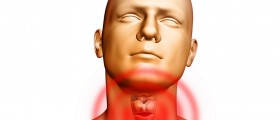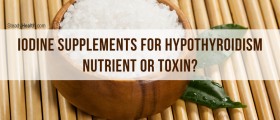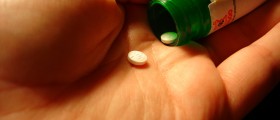
Iodine
Although iodine is present in small quantities (10-20 mg) in the organism, it is essential for life. It is a chemical element found in seawater and was accidentally discovered in 1811.Iodine is essential for maintaining normal metabolism, and 90% of it, in the human body, is in the thyroid, making the main part of the hormones T3 and T4.
Iodine is necessary for the proper development of nerve, muscle and bone systems of a fetus and newborn, and its deficiency can lead to serious physical and mental disorders. In adults, this mineral stimulates organism functioning.
Iodine Deficiency Symptoms
Iodine deficiency does not cause specific symptoms, but common problems. Fatigue, dry, rough and cold skin, drowsiness, feeling cold, constipation are often problems in a person suffering from a lack of iodine. Also, lack of iodine may cause difficult breathing, face paleness and shiver.Iodine Deficiency Disorders
Iodine deficiency causes the thyroid gland disorders, goiter, reduced working capacity, anemia, heart disorders, problems in the reproduction of offspring, premature birth, the decrease of concentration and learning abilities, and the most serious complication caused by lack of iodine in the organism is endemic cretinism.Iodine is necessary for the proper growth and development of all organs and tissues, especially, the brain. It is the basic building block of thyroid hormone. Iodine deficiency is the leading single preventable cause of serious children’s mental and physical retardation in the world. Thus, iodine deficiency lowers total IQ for 13.5 to 15 IQ points on the level of the entire population.
Iodine is one of the most important nutritional elements for the development of neural network. The most important thing is taking enough iodine during pregnancy, breastfeeding and up to the second year of life, because the consequences of a lack of iodine in this period are permanent, irreparable and incurable.
The recommended daily dose is about 150 micrograms of iodine per day for adults. Most of it can be found in the food of marine origin, egg yolk, meat and milk, iodizing salt and water that contains naturally dissolved iodine.
There are regions with the chronic deficit of iodine, such as areas of high mountains (Alps, Andes, Himalayas) where this oligoelement is washed by glacier erosion.
Switzerland and Japan have no problems of this kind. Some scientists have even directly connected economic power of the nation with iodine intake, and their conclusions are based on the fact that Japan and the Scandinavian countries as examples of economic success are also the countries with the highest average intake of iodine per capita.
Interesting Facts
One in five women does not know whether the iron is switched off, and every eighth woman wonders if she turned off a hotplate when she leaves the house.About 35 % of men address the girlfriend by name of ex, 92 % of people does not remember the name of the person they had just met.
Every day, 6 % of children remain longer in day-care because their parents forgot to come to pick them up.
Every fifth man is looking forward to Saturday as tomorrow from Thursday, and 15 % of people come back to see if they locked the door every day.
26 percent of drivers forget where they parked the car daily.
These are some unofficial data that indicate the decline of attention, and the main culprit is a lack of iodine in the body.
















-In-Infants-And-Older-Children_f_280x120.jpg)
Your thoughts on this
Loading...